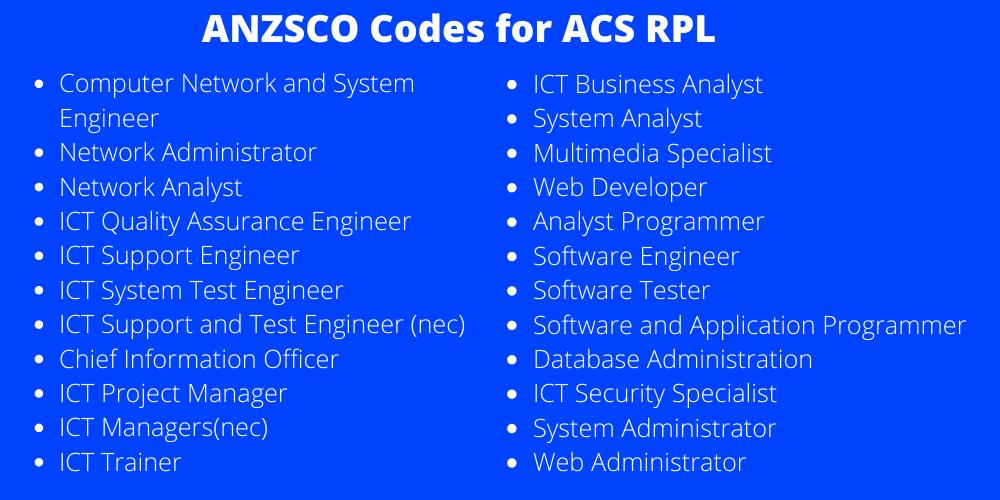
Most in-demand ICT jobs in Australia
Most Australian businesses, non-profit agencies, governments, schools, colleges, hospitals, and banks use ICT to communicate in digital work. The demand for people like software engineers, cloud engineers, Web developers, software developers, data scientists, IT managers, and many more is increasing day by day to help mold the traditional organization into a digital world.
A new ACS report shows Australia needs an additional 100,000 ICT employees by 2024. So, the demand for ICT jobs is rapidly increasing in Australia.
Each year, thousands of people migrate to Australia to get ICT jobs in Australia from around the globe. There are different ways to get a job and settle in Australia for foreign people. There are many ways to migrate to Australia, but here we give suggestions for non-ICT qualified people with exceptional skills and experience in the IT sector. Many ICT professionals do not have ICT qualifications but gain expertise and experience in the ICT sector. So, this can help you to get a job and settle in Australia for a bright future.
Here is the list of most demand ICT jobs in Australia:
Cloud engineers and cloud architects
ANZSCO 263111 – Computer network and system engineer

Today’s world depends on cloud IT services because we use cloud services, for example, storing data or information on the internet, playing games, transferring data, and many more. Australian industry has increased cloud services for its and users’ purposes. The increase of the cloud as a must-have on an individual or business level has initiated the market for cloud engineering.
The main reason for using cloud services is that it provides an open market for customers to shop for industry products and services.
Cloud Engineers can apply for visas in the General Skilled Migration (GSM) program. Skilled Independent 189, Skilled Nominated 190. Skilled Regional Nominated 489 or Skilled Regional Sponsored 489 visas are included in this category.
Project managers:
ANZSCO 135112

Project Manager‘s role is to plan, organize, control, and coordinate quality ICT projects.
With the increasing ICT technology, project manager jobs are increasing daily in Australia because every industry is now focused on developing IT projects. Each project has different project managers so they can manage enterprise resources, schedule, task coordination, meet with employees, and address issues within the time-frames.
The main reason for the increasing demand for project managers is that they do each task, for example, planning, organizing, directing, regulating, coordinating, developing, maintaining, and implementing the projects according to the enterprise level.
Network engineers:
ANZSCO 263111

A network engineer’s roles and responsibilities are to set up, develop, and maintain computer networks within an Australian organization or between organizations. They can facilitate data or information passing from one device to another in a system to aid communication between users and employees.
Network engineers can also be called:
- Network Architect/Computer Network Architect
- Network/Help Support
- Support/Security/System Engineer
- Network Administrator
- VoIP/Cisco Engineer
Types of work for network engineers:
Network Engineers are used in every industry, such as
Local Area Network: Engineers must work in a small office, home, or apartment to manage networks.
Metropolitan Area Network: In this network, Engineers have to manage large areas such as colleges, large organizations, and many more. Their task is burdensome and complicated as compared to the Local Area Network. There is a high demand for jobs in these areas in Australia.
Wide Area Network: Engineer’s task is to manage computer networks inside Australia or outside Australia.
Global Area Network: An example of this network is mobile communication technologies.
Server Area Network
Controller Area Network
Personal Area Network
Voice Over Internet Protocol Network
Software Engineer:
ANZSCO 261313
Software Engineer roles are to design, develop, modify, document, test, install and support software applications and systems in ICT industries. With the increasing demand for algorithm design and development software engineers, jobs are getting hotter in Australia.
The next ten or twenty years are all about software engineers in Australia.
The main reasons why the demand for software engineer jobs is high in Australia are:
- Increasing AI and Machine Learning
- Increasing Software Debugging or Testing
IT innovative thinker

Innovative thinking is doing something creative, new, or old in a new way. Information Technology(IT) is all about creative and innovative minds. If you have creative ideas to design and develop, then it’s a good chance to apply in Australia. IT and innovative thinking jobs are in high demand not only in Australia but around the globe.
Security specialist
ANZSCO 262112
Industry data or information security is a significant challenge in Australia. So, they want to hire a security specialist to build, manage, and govern an organization’s ICT security policy and procedures to prevent and recover or depreciate the risk of security threats.
Security specialist jobs increasing in Australia because
- They help to secure and maintain the backup of the organization’s data.
- They help with testing databases and upgrades, such as debugging, tracking, and resolving all identified programs in the program.
- All in One: A security specialist’s job is to secure and prevent their organization’s data from cyber attacks.
- Cyber threats in Australia are at risk. So, Australia wants to protect sensitive personal and business data, financial information, and military secrets from malicious hackers and cyber attacks.
Computer security specialists use their skills and knowledge to prevent cyber-attacks at this stage. It is estimated that the demand for security specialist jobs in Australia will increase by 28% by 2026.
Database administrators:
ANZSCO 262111

The main task of a Database Administrator in Australia is to plan, develop, maintain, manage, and administer the organization’s database management system. Database Administrators(DBAs) develop close relationships with security specialists so they can manage and secure databases from unauthorized users.
Other similar names of database administrators
- Database Specialist
- DBA
- Database Support
- Data Scientist
- Database Operator
The top responsibility of a DBA professional in Australia is to maintain data integrity.
All data are digitized, so database administrator and data scientist jobs are also common in Australia. DBAs can work in banks, the military, government offices, insurance companies, universities and colleges, hospitals, and many more.
Duties of database administrator:
- Manage user data, install databases, upgrade them, and patch them.
- Install and configure relevant network components.
- Resolving database issues related to user data.
- Create sole models for new database development or update existing databases.
- Database performance testing and increase its speed.
- Monitor database system details.
- Data migrations.
- Execute database encryption and data encryption
- Make a backup of the database.
The average demand for database administrator jobs in Australia will rise by 11% in 2026.
Computer system analyst:
ANZSCO 26112
Sometimes also called a “System Analyst“, A computer system analyst’s job is to investigate a company’s existing computer systems and software procedures and then design them to make the organization operate more effectively.
Computer system analysts in Australia have the following roles and responsibilities:
- Identifying, investing, and analyzing the business process of an industry.
- Developing functional specifications for use by system developers.
- Using data and process modeling techniques to create precise system specifications for the design and expansion of system software.
The average growth percentage of computer systems analysts is expected to be 9% by 2026.
IT manager:
ANZSCO 135199
An IT manager is essential for the overall representation of the company’s electronic network and leads the IT department. Every industry hires an IT manager, no matter what industry it is. So, the jobs of IT managers are increasing rapidly in Australia.
Roles and Responsibilities of IT manager in Australia:
- Implementing and sustaining an organization’s technology infrastructure.
- Monitor organization technology and build a cost-effective system to achieve its goals.
Web developer:
ANZSCO 261212

Web Developers develop the backbone of a website by designing, developing using different front-end and back-end languages, and maintaining the site. Every sector of the Australian industry uses websites, so the number of web developers jobs is increasing daily in Australia.
Web Developers use different programming languages to create web applications.
The increasing job rate of web developers in Australia will be 15% by 2023.
Software developer:
ANZSCO 261313
Software developers create applications or systems for users or industries that can run on different platforms of devices. They develop software programs by using a programming language.
Roles and responsibilities of software developers in Australia:
- Design, Develop software according to customers’ needs and Test it.
- Upgrade the existing software.
- Collaborate with other computer specialists.
The projected future growth rate of the Software Developer will be 15% by 2023.
Highest paying tech jobs in Australia
According to payscale.com, the following are the highest-paying tech jobs in Australia.
| Job Title | Average Annual Salary | Roles and Responsibility |
|---|---|---|
| Enterprise Architect | AU$ 160,140 | Making sure that a company’s business strategy uses proper technology system architecture to achieve its goal |
| Software Engineering Manager | AU$ 142,374 | Project management, performance management, communication, recruitment, and many more |
| Senior Product Manager | AU$ 125,851 | Develop and implement product strategies and launch consistent with the company goal. |
| Analytics Manager | AU$ 121,519 | Researching and making effective methods to collect data, analyzing information, and recommending solutions to a business. |
| Technical Lead | AU$ 115,818 | Lead the organization in terms of technology |
| Software Architect | AU$ 114,832 | Interact with clients and product manager. Review software code. |
| Engineering Lead | AU$ 112,731 | Coding and people management and leadership activity. |
| Product Owner | AU$ 107,031 | Manage daily project goals and product schedules. |
| Senior Java Developer | AU$ 106,254 | Coding |
| Network Security Engineer | AU$ 79,096 | Maintain firewall, VPN, web, and email security programs. Managing overall network infrastructure. |
ICT industry future in Australia:

Demand for skilled ICT employees will increase in Australia with an additional estimated 30000 each year. This is an essential requirement for employees, and Australian companies want trained and experienced employees rather than qualified ICT students. So employees should focus on ICT skills as well as qualifications.
If you are ICT qualified and want to migrate to Australia without ICT qualification, then we are here to make the most suitable ACS RPL report.
The ICT sector is getting hotter and more passionate because of the increasing demand for jobs for employees. ICT embraces almost every industry in the modern era. It helps to increase business growth, and it also helps to make the world a global village in terms of interconnections among people and businesses in Australia or worldwide.
The main reason for increasing ICT jobs in Australia is that they enhance the performance, quality, and quantity of business in a short period of time with low cost and resource consumption. It provides an ecosystem to understand, shape, drive, and intrigue standards relevant across the Australian industry for interoperability and security.
Additional questions about ICT jobs in Australia:
I don’t have an ICT qualification but have skills and experience in the ICT sector. Please help me get a visa to migrate to Australia.

Well, you don’t have to worry about it. If you work as an ICT Professional and gain experience, our expert can write an RPL Report for you.
Is the RPL Report necessary for Non-Qualified ICT professionals to migrate?
Recognition of Prior Learning(RPL) is a way to use your existing skills and experience to get a formal qualification. There is only one way to migrate to Australia: the RPL report if you don’t have an ICT qualification.
What is the best Australian City to find IT jobs?
According to Quora, most IT professionals choose Canberra because they think Canberra industries pay high rates and are easy to find jobs.
What are the ICT-nominated ANZSCO Codes?
There are 23 ICT-nominated ANZSCO Codes.

How to make an RPL Report if your occupation is not on the list?
Before submitting your RPL Report to an ACS, you have to show your skill occupation code(ANZSCO code) in the report. So, if your occupation does not match the nominated ANZSCO code, contact our RPL report writer.
Conclusion
All of the above-demanded ICT jobs have different tasks and goals. There is no limit to these jobs. Various industry sectors require other ICT jobs to fulfill their desire. You should not follow what jobs are most in-demand or what ICT jobs give a high salary in Australia. All you need to do is follow which field you are interested in, and follow on which position makes you happy. So, follow your passion, not trends.





